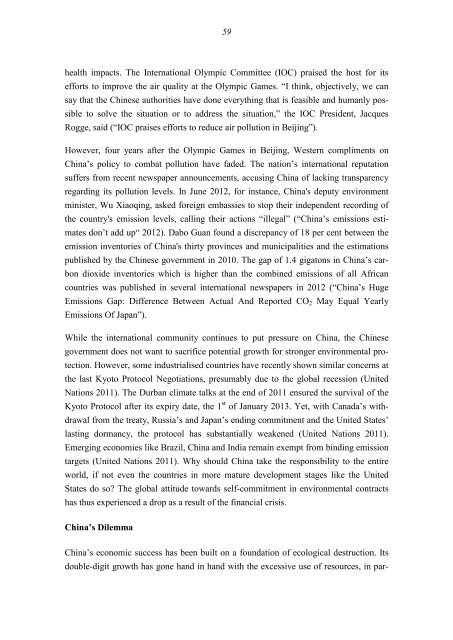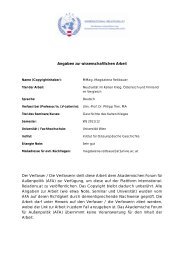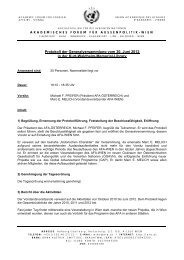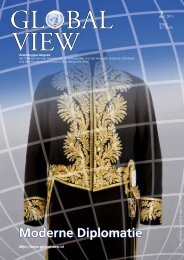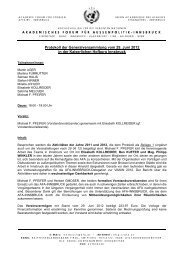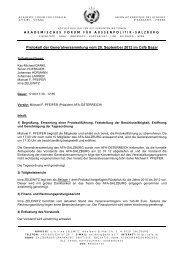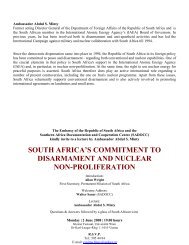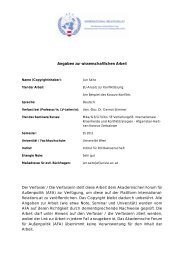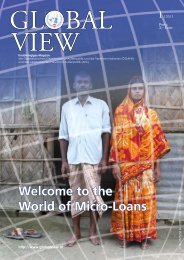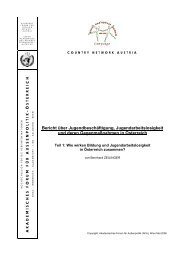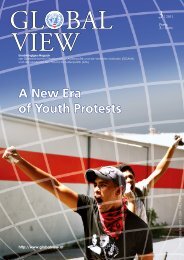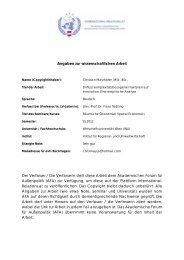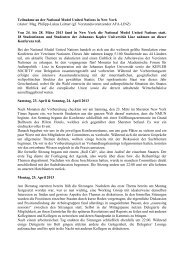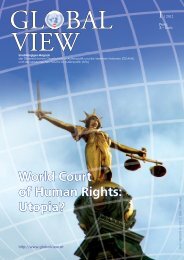GAP-JOURNAL 2012/13 - AFA
GAP-JOURNAL 2012/13 - AFA
GAP-JOURNAL 2012/13 - AFA
Sie wollen auch ein ePaper? Erhöhen Sie die Reichweite Ihrer Titel.
YUMPU macht aus Druck-PDFs automatisch weboptimierte ePaper, die Google liebt.
59<br />
health impacts. The International Olympic Committee (IOC) praised the host for its<br />
efforts to improve the air quality atthe Olympic Games. “Ithink, objectively, we can<br />
say that the Chinese authorities have done everything that is feasible and humanly possible<br />
tosolve the situation ortoaddress the situation,” the IOC President, Jacques<br />
Rogge, said (“IOC praises efforts to reduce air pollution inBeijing”).<br />
However, four years after the Olympic Games in Beijing, Western compliments on<br />
China’s policy tocombat pollution have faded. The nation’s international reputation<br />
suffers from recent newspaper announcements, accusing China oflacking transparency<br />
regarding its pollution levels. In June <strong>2012</strong>, for instance, China's deputy environment<br />
minister, Wu Xiaoqing, asked foreign embassies tostop their independent recording of<br />
the country's emission levels, calling their actions “illegal” (“China’s emissions estimates<br />
don’t add up“ <strong>2012</strong>). Dabo Guan found adiscrepancy of 18 per cent between the<br />
emission inventories ofChina's thirty provinces and municipalities and the estimations<br />
published bythe Chinese government in 2010. The gap of 1.4 gigatons in China’s carbon<br />
dioxide inventories which is higher than the combined emissions ofall African<br />
countries was published inseveral international newspapers in <strong>2012</strong> (“China’s Huge<br />
Emissions Gap: Difference Between Actual And Reported CO 2 May Equal Yearly<br />
Emissions OfJapan”).<br />
While the international community continues toput pressure onChina, the Chinese<br />
government does not want to sacrifice potential growth for stronger environmental protection.<br />
However, some industrialised countries have recentlyshown similar concerns at<br />
the last Kyoto Protocol Negotiations, presumably due tothe global recession (United<br />
Nations 2011). The Durban climate talks atthe end of2011 ensured the survival ofthe<br />
Kyoto Protocol after its expiry date, the 1 st of January 20<strong>13</strong>. Yet, with Canada’s withdrawal<br />
from the treaty, Russia’s and Japan’s ending commitment and the United States’<br />
lasting dormancy, the protocol has substantially weakened (United Nations 2011).<br />
Emerging economies like Brazil, China and India remain exempt from binding emission<br />
targets (United Nations 2011). Why should China take the responsibility to the entire<br />
world, if not even the countries in more mature development stages like the United<br />
States do so? The global attitude towards self-commitment in environmental contracts<br />
has thus experienced adrop as aresult ofthe financial crisis.<br />
China’s Dilemma<br />
China’s economic success has been built on afoundation ofecological destruction. Its<br />
double-digit growth has gone hand in hand with the excessive use of resources, in par-


